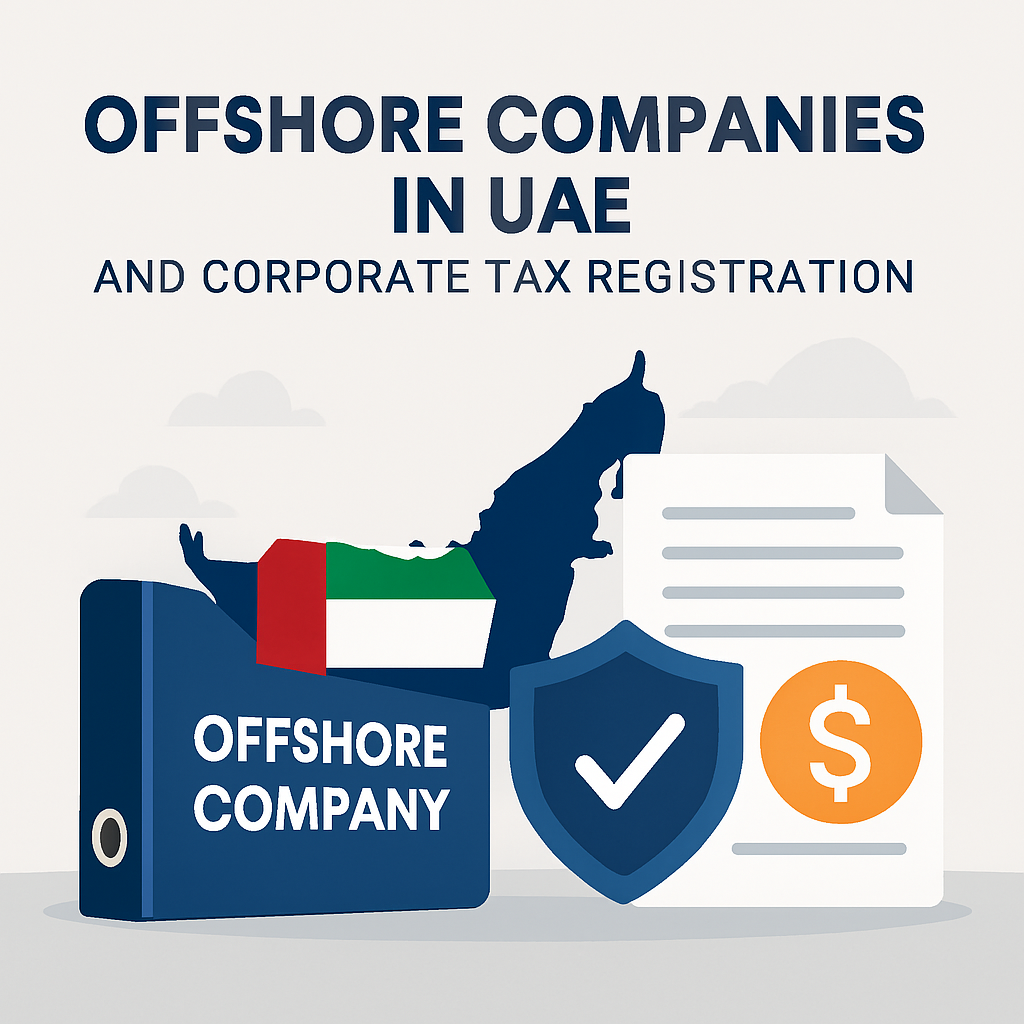The legislation that allowed foreign investors to set up offshore companies in UAE was passed in 2003. Since then, starting an offshore company in the UAE has become an appealing option for businesses looking to benefit from the country’s tax advantages and (obviously) strategic position in the global market.
The introduction of the UAE Corporate Tax Law has made it essential for offshore companies to register for tax purposes in certain situations.
That’s why, in this article, we will break down the process of registering for corporate tax (including deadlines, requirements, etc.) for offshore companies.
Offshore companies in UAE are legally established in free zones
They are generally set up to conduct international business WHILE benefiting from favourable tax conditions.
These businesses are not allowed to operate directly in the UAE market but can run global operations from the UAE.
Under the new tax laws, offshore companies must register for corporate tax under certain conditions.

Corporate tax refers to the taxes that offshore companies have to pay on income generated from their operations… specifically if the income is sourced in the UAE or if they have a permanent establishment (PE) in the country.
So, why does it matter? Well, offshore companies in UAE have enjoyed tax exemptions for a long time, but since 1 March 2024, the Federal Tax Authority (FTA) Decision No. 3 have forced certain offshore businesses to comply with the tax registration process.
This means that failure to register could lead to penalties or other legal issues that can affect your business operations.
Not all offshore companies need to register for corporate tax!
The UAE Federal Tax Authority (FTA) has clearly outlined scenarios where offshore companies must and must NOT register.
If your offshore company meets any of the following criteria, you must apply for corporate tax registration:
- If your offshore company is registered in the UAE and is conducting business or earning income sourced from within the country, you need to register for corporate tax.
- If your offshore company is managed or controlled from the UAE, you may also be required to register for corporate tax. EVEN if it does not directly operate in the UAE.
- If your offshore company has a permanent establishment in the UAE, meaning a fixed place of business or ongoing economic activity within the country, it is also obligated to register.
- If your offshore company establishes any form of economic connection with the UAE, registration for corporate tax will be necessary.
Again – these guidelines are set out in the FTA Decision No. 3 of 2024, and the rules apply to companies in both free zones and foreign-owned businesses.
Obviously, if your business doesn’t meet these criteria, you’re likely exempt from the tax registration process.
How to register for corporate tax in the UAE
Here’s a breakdown of how to do it:
Step 1: Assess your taxability status
This means, giving an answer to the question, “Is my offshore company required to pay this corporate tax in the first place?”
Refer to the above section to get this answer. But basically, if your company has income sourced within the UAE or has a permanent establishment in the country, it is subject to tax registration.
Essentially, if you’re running operations in the UAE, even if they are limited or indirect, you will need to register for tax.
Step 2: Gather the necessary documents
Once you’ve determined that tax registration is required, you’ll need to prepare the following documents:
- Trade license: A copy of your offshore company’s trade license.
- Memorandum of Association (MOA) / Articles of Association (AOA): These documents outline the company’s structure and objectives.
- Certificate of incorporation: Proof of the company’s legal establishment.
- Shareholders and directors list: Information on the company’s owners and directors.
- Financial statement or business activity report: Details about your company’s financial activities and business operations.
Step 3: Register on EmaraTax Portal
The UAE Federal Tax Authority (FTA) has created an exclusive online portal for offshore companies to register for corporate tax. This platform, known as EmaraTax, allows you to submit your application electronically.
After you’ve gathered all your documents, you’ll need to create an account on the portal.

Step 4: Submit your application
Once you’re logged into the EmaraTax portal, you will need to file your registration application for corporate tax. You must provide accurate information about the type of business you operate, the revenue it generates, and other key details.
Make sure that the data you submit is correct if you want to avoid any possible delays and/or penalties.
Step 5: Obtain your Tax Registration Number (TRN)
After submitting your application, the FTA will review your documents and information. If everything is in order, they will issue a Tax Registration Number (TRN).
This number confirms that your offshore company has successfully registered for corporate tax and is compliant with UAE tax laws.
What about the deadlines?
- If a foreign company develops an economic connection or nexus with the UAE, they must apply within 3 months from the date the conditions for nexus are met.
- Fornon-resident offshore companies in UAE that have established a permanent business presence in the UAE, they have 9 months from the date of their setup to register.
The corporate tax rate in the UAE is set at 9%
This is true for taxable income exceeding AED 375,000. However, offshore companies may not be able to benefit from the usual tax exemptions, depending on their structure and operations.
Companies engaged in specific economic activities, such as those falling under the Economic Substance Regulations (ESR), may need to pay corporate tax on their income…EVEN if it is sourced outside of the UAE.
Final thoughts
While in offshore companies have long benefited from favourable tax conditions, these new regulations ensure that businesses contributing to the UAE economy are paying their fair share of taxes.
Indeed there are offshore companies may qualify for exemptions under certain circumstances, but this is generally limited. But, if you believe your company may be eligible for an exemption, it’s advisable to consult with tax professionals to explore available options.
